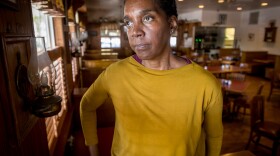I must admit, I’m really into names.
Maybe because everywhere I go, many of the people I meet always ask me, “Where did you get that name?” Then they answer their own question: "I bet your father’s name was Leon or Leonard."
Ding, ding, ding! That’s right. Leonard Inge.
And when one prepares to part his or her lips to ask about my last name, Inge, they soon regret it. My daddy, Leonard Inge, told me to tell them, "I have no idea who raped my great, great, great grandmother."
"If you look at the last names of African Americans, because of the process after Emancipation of simply adopting the surnames of the enslaver, our last names are not particularly distinctive," explains Trevon Logan, a distinguished Professor of Economics and Associate Dean of the College of Arts and Sciences at Ohio State University.
“And so it is our given names that therefore denote our racial identity. And that’s another distinction that is really different for African American people. Because we are forced by history to use our given names as racial identifiers, in a way that whites do not have to because they have ethnic identifies through their surnames," Logan says.

But I do know one of my great-great grandmothers was named Kizzy. Many of us haven’t said that name aloud since the 1970s, when Alex Haley’s “Roots” was televised.
And then the coronavirus pandemic hit and my ears perked up every time I heard someone say, “Dr. Kizzmekia Corbett.” Dr. Kizzy, for short. I think the name Kizzy is making a comeback.
In “Roots,” Kizzy was an enslaved African woman and daughter of the most memorable character in the saga, Kunte Kinte, so to hear Dr. Kizzy’s name over and over in the news brings a smile to my face.
Dr. Kizzy is a Black woman and a scientist who helped lead the development of the Moderna COVID-19 Vaccine. And she’s only 35. But Dr. Corbett explains she’s more than just a scientist.
"I am Christian. I’m Black. I am Southern, although I have been in Maryland for this time around six years," she said in an interview with Black Enterprise. "I’m an empath. I’m feisty, sassy, fashionable. That’s kind of how I describe myself. I would say my role as a scientist is really about my passion and purpose for the world, and for giving back to the world."
Thanks, Dr. Kizzy.
African American names are as improvisational as Jazz and as flavored as gumbo. I was reminded of that by Professor Logan.
"One of those things that I wish will be discussed a little bit more about Black names and African American names is their inherent creativity," Logan said.
"The conventional wisdom certainly was that beginning in the 1960s - the rise of Black Power movement, really the apex of the 20th Century Civil Rights Movement - came at a time in which African American people were less willing to be assimilationist, and much more wanting to be direct, and wanting to really actually, in a sense, reclaim their African heritage," Logan says. "And so one way of doing that would be names."
"But one of the particular questions and peculiarities of this is that the names that we now think of as being 'Black names,' many of them do not have explicit African origins," he continues.
Logan's own given name comes from a unique naming pattern in his family.
"My father's name is Thomas. My mother's name is Diana. And so they wanted the remaining children to have a T and D as the as the initials," he says. "My mother liked the name Trevor, but not enough to name her son. And so - again, in a creative process - she just took off the R, and put on an N and said, 'Trevon.'"
Meanwhile, Dr. Kizzmekia Corbett has made the rounds, spreading the word about the importance of being vaccinated.
"I think what I would say to people who are vaccine hesitant is that, you’ve earned the right to ask the questions that you have around these vaccines and this vaccine development process," Dr. Corbett told Dr. Sanjay Gupta on the CNN podcast “Chasing Life.”
"And this overarching mistrust of the medical institution in general is something that is being highlighted now because of the dire circumstances that we are in. But it is not news to me because I’m Black and I have a Black family and I am well-read on the history of injustice when it comes to medicine in the Black community," she said.
"The first step as scientists, and physicians, and vaccine developers, etcetera, is to understand that the onus of this problem is not on them and their distrust, it is on us and our level of trust worthiness. And so trust, especially when it has been stripped from people, has to be re-built, in a brick by brick fashion. And so what I say to people, firstly, is that I empathize and secondly, I am going to do my part in laying those bricks."
We all have some building to do. Meanwhile, Dr. Kizzmekia Corbett has decided to leave her post at the National Institutes of Health. Later this month, she begins a new adventure, at Harvard University. Dr. Kizzy will head the new “Coronaviruses and Other Relevant Emerging Infectious Diseases Lab.”







